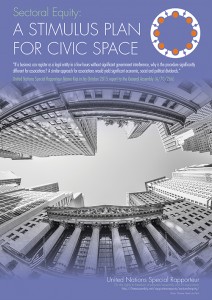Comparing States’ treatment of businesses and associations worldwide
By United Nations Special Rapporteur • October 28, 2015 In this report, Maina Kiai’s third to the United Nations General Assembly, the Special Rapporteur compares the enabling environments that States, multilateral organizations and other actors create for businesses and associations, and highlights instances where they are treated inequitably.
In this report, Maina Kiai’s third to the United Nations General Assembly, the Special Rapporteur compares the enabling environments that States, multilateral organizations and other actors create for businesses and associations, and highlights instances where they are treated inequitably.
Although businesses and associations are distinct bodies that pursue different motives, they share similarities, most notably that they are both non-State actors and vehicles to unite people to pursue a particular goal, whether economic, political, social, cultural or otherwise.
Despite those similarities, the Special Rapporteur has found that States and others often impose more burdensome regulation upon associations, both in law and in practice, with businesses receiving more favourable treatment. The net result is that for businesses the enabling environment — defined broadly as action or inaction by States and other actors to promote a particular non-State sector — is typically much better than it is for associations.
Download the full report in English here.
Download the factsheet in English here.
Tags: ASEAN, Civil Society, Economy, Freedom of Assembly, Freedom of Association, Freedom of Expression, Human Rights, United Nations Special RapporteurThis post is in: ASEAN, Business and Human Rights, Crimes Against Humanity, Economy, Environmental and Economic Justice, Human Rights, International Relations, Law
Related PostsBurma Partnership Celebrates Continuing Regional Solidarity for Burma and Embraces the Work Ahead for Progressive Voice
Myanmar’s New Dawn :Opportunities for Aung San Suu Kyi and U.S.-Myanmar Relations
Expanding People’ Solidarity for a Just and Inclusive ASEAN Community
Civil society launches #FreeThe5KH campaign in support of the imprisoned ADHOC staff and NEC official
Myanmar logging ban a major step to forest sector reform









 All posts
All posts